| |||||
| Decades: | |||||
|---|---|---|---|---|---|
| See also: | Other events of 1869 List of years in Argentina | ||||
Events in the year 1869 in Argentina .
| |||||
| Decades: | |||||
|---|---|---|---|---|---|
| See also: | Other events of 1869 List of years in Argentina | ||||
Events in the year 1869 in Argentina .
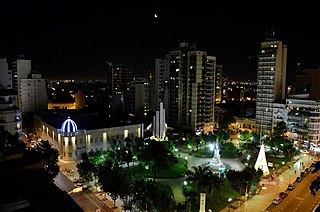
Avellaneda is a port city in the province of Buenos Aires, Argentina, and the seat of the Avellaneda Partido, whose population was 342,677 as per the 2010 census [INDEC]. Avellaneda is located within the Greater Buenos Aires metropolitan area, and is connected to neighboring Buenos Aires by several bridges over the Riachuelo River.

Lanús is a partido in Buenos Aires Province, Argentina, at the south of the Gran Buenos Aires urban conglomerate neighbouring Buenos Aires city.

Valentín Alsina was an Argentine lawyer and politician.

Adolfo Alsina Maza was an Argentine lawyer and Unitarian politician, who was one of the founders of the Autonomist Party and the National Autonomist Party.
The Battle of Cepeda of 1859 took place on October 23 at Cañada de Cepeda, Buenos Aires Province, Argentina. The Argentine Confederation army, led by federalist Justo José de Urquiza defeated the State of Buenos Aires forces, led by unitarian Bartolomé Mitre.

Valentín Alsina is a city in the Lanús Partido of Buenos Aires Province, Argentina. It is located next to Buenos Aires city in the Gran Buenos Aires urban area.

The Buenos Aires Midland Railway (BAM) was a British-owned railway company which operated in Argentina, where it was known as Ferrocarril Midland de Buenos Aires. The company built and operated the 1,000 mm gauge line between Puente Alsina and Carhué in Buenos Aires Province.

Puente Alsina is an Argentine railway station in the Greater Buenos Aires neighbourhood of Valentín Alsina in the Lanús partido of Buenos Aires Province. The station takes its name from the nearby bridge of Puente Alsina over the Riachuelo River. On the other side of this bridge lies the neighbourhood of Nueva Pompeya within the city of Buenos Aires.
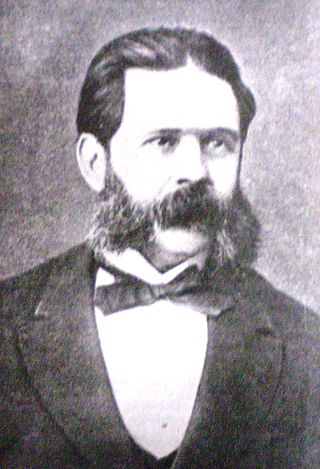
Mariano Acosta was an Argentine lawyer and politician.
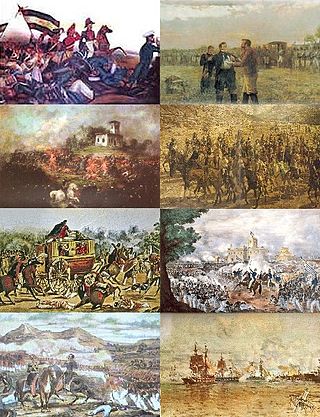
The Argentine Civil Wars were a series of civil conflicts of varying intensity that took place through the territories of Argentina from 1814 to 1853. Beginning concurrently with the Argentine War of Independence (1810–1818), the conflict prevented the formation of a stable governing body until the signing of the Argentine Constitution of 1853, followed by low-frequency skirmishes that ended with the Federalization of Buenos Aires in 1880.
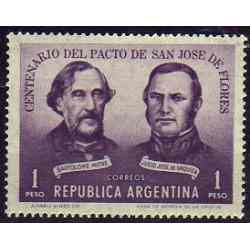
The Pact of San José de Flores was a treaty signed between the Argentine Confederation and the State of Buenos Aires on November 11, 1859, on the aftermath of the Battle of Cepeda. It established guidelines for the entry of the latter into the Confederation, and Buenos Aires' acceptance of the Argentine Constitution of 1853.

The State of Buenos Aires was a secessionist republic resulting from the overthrow of the Argentine Confederation government in the Province of Buenos Aires on 11 September 1852. The State of Buenos Aires was never explicitly recognized by the Confederation; it remained, however, independent under its own government and constitution. Buenos Aires rejoined the Argentine Confederation after the former's victory at the Battle of Pavón in 1861.
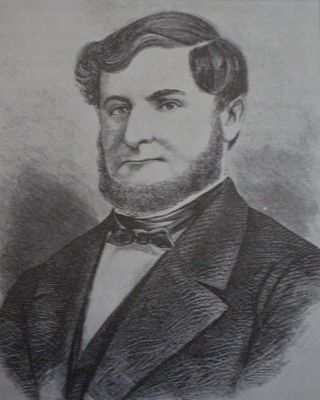
Pastor Obligado was an Argentine lawyer and lawmaker who served as Governor of the secessionist State of Buenos Aires from 1853 to 1858.

Events in the year 1870 in Argentina.
Events in the year 1871 in Argentina.
Events in the year 1872 in Argentina.
Events in the year 1873 in Argentina.
Events in the year 1868 in Argentina.

The Argentine presidential election of 1874 was held on 12 April to choose the president of Argentina. Nicolás Avellaneda was elected president.
The Revolution of 11 September 1852 was a conflict between the Province of Buenos Aires and the government of Justo José de Urquiza after the latter triumphed over Juan Manuel de Rosas at the Battle of Caseros.